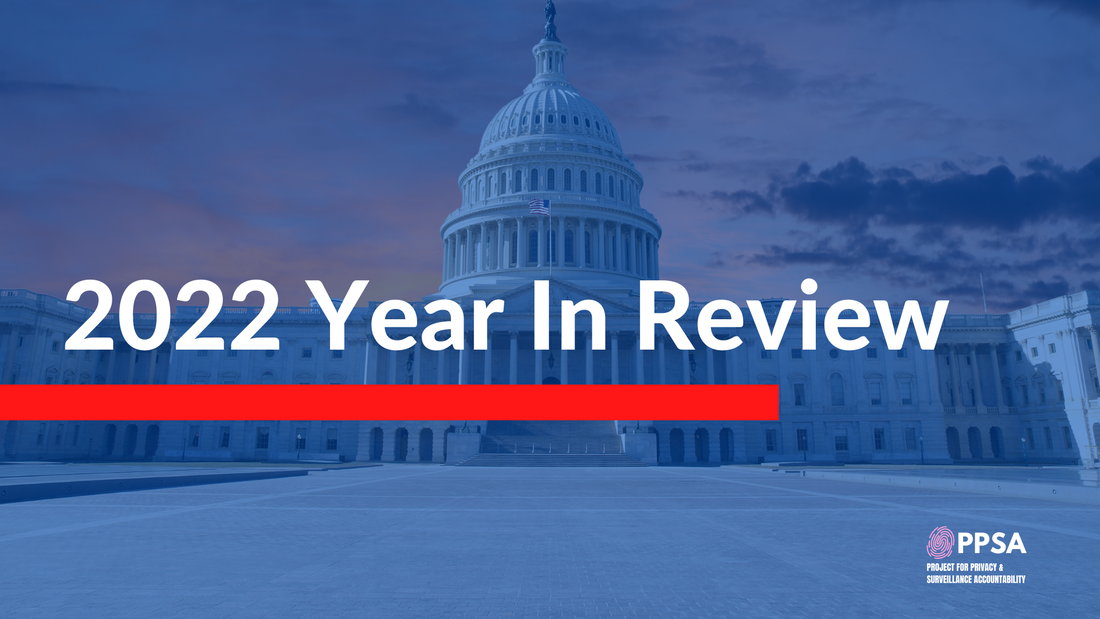2022 Year in Review: FOIA Revelations and Growing Bipartisan Support for Critical Reform Measures1/9/2023
The Project for Privacy and Surveillance Accountability wore holes in the bottoms of our shoes on Capitol Hill to advocate for common sense reforms of federal surveillance practices. We also wrestled with federal agencies in court to glean insights into the state of surveillance. Through our Freedom of Information Act (FOIA) requests and lawsuits, we compelled the release of documents about how federal agencies are getting around the Fourth Amendment of the U.S. Constitution to access our most private information.
PPSA’s Legislative Year PPSA was instrumental in helping pass the NDO Fairness Act in the U.S. House of Representatives in 2022. This bill promises to curb the routine government practice of using Non-Disclosure Orders to block telecommunication service providers from notifying their customers that a search of their personal information has been conducted by prosecutors.
PPSA encouraged Members of Congress in both parties to sponsor the Fourth Amendment Is Not for Sale Act. This measure would require law enforcement and intelligence agencies to seek probable cause warrants before accessing our personal information scraped from social media and apps.
We also built on our advocacy that helped the Lee-Leahy Amendment pass the U.S. Senate with 77 votes in 2020. This amendment would require the secret Foreign Intelligence Surveillance Court to appoint an expert attorney to represent the privacy interests of American citizens – a common sense requirement in a court with secret operations that continues to withhold some of its past rulings to this day.
PPSA goes into 2023 with the firm intention of encouraging our champions in the House and Senate to block the reauthorization of Section 702 unless these necessary reform measures are attached to that authority or passed separately. Freedom of Information Act Revelations PPSA argued before a federal court that challenges the government’s abuse of the Glomar doctrine, a judicially created maneuver that allows the government to neither “confirm nor deny” the existence of records in response to a FOIA request. We have highlighted the absurd, Catch-22 response from the FBI that it cannot even conduct an internal search for its own documents (in this case, correspondence between the bureau and Members of Congress) without endangering national security. Other FOIA requests have challenged the secret practices of U.S. law enforcement and intelligence agencies, as well as the suppression of judicial opinions. One such PPSA FOIA yielded an FBI document revealing its collection of web browsing histories of Americans. “This shows the FBI has a secret policy governing the collection of web browsing data of Americans,” responded Gene Schaerr, PPSA general counsel. “Web browsing data is deeply personal information. It can highlight a person’s religious beliefs, political allegiances, and personal relationships.” Another PPSA FOIA request is seeking to obtain the secret opinions of the Foreign Intelligence Surveillance Court and the Foreign Intelligence Surveillance Court of Review. “The very idea of secret law – which can affect the free expression and privacy of millions of Americans – is not compatible with the basics of American democracy,” Gene Schaerr declared in a public statement. “These secret precedents and opinions are corrosive to the operations of a free society. It’s time for the government to come clean.” Other recent revelations revealed by PPSA FOIA requests show that training documents for U.S. Attorneys require them to “always” seek a Non-Disclosure Order with a warrant application or subpoena. Our FOIA request also revealed documents that direct U.S. Attorneys to seek targets’ location histories from email, social media, or web hosting providers. In the Courts PPSA petitioned the U.S. Supreme Court in Torcivia v. Suffolk County to decide whether the Fourth Amendment recognizes a “special-needs” exception to the Constitution’s warrant requirement. Although the petition was ultimately denied, we cast a spotlight on the importance of the High Court ruling on law enforcement’s exceptions to the Fourth Amendment.
In short, 2022 was a building year. Major reform legislation, from Lee-Leahy, to the Fourth Amendment Is Not for Sale Act, to the NDO Fairness Act, have attracted growing bipartisan support and momentum for passage. We look forward to a productive year, both on Capitol Hill and what can be learned about secret surveillance through the courts. Comments are closed.
|
Categories
All
|


 RSS Feed
RSS Feed